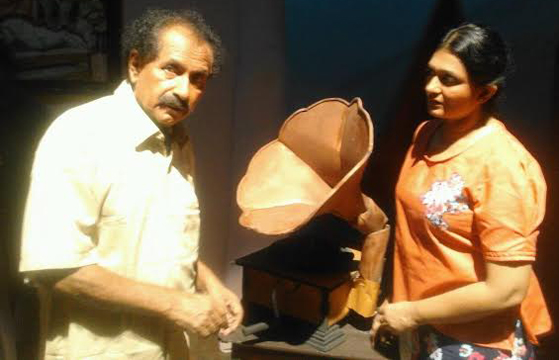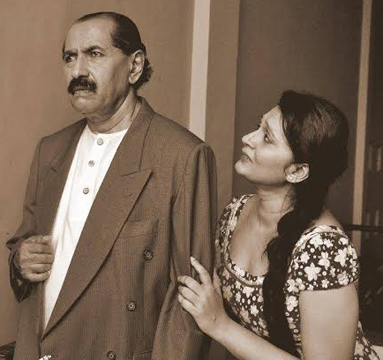|
DRAMA
REVIEW
Jayalath Manorathana's Handa Nihanda:
Home truths and stark revelations
by Dilshan Boange
Thunder and lightning vied for prominence at the Wendt as Handa
Nihanda (Vocal and Silent), the latest creation of Jayalath Manorathna,
veteran of the stage and screen, came to life on March 4. A solitary
figure bearing a dim kerosene lamp appeared in a partially lit stage,
revealing the living room of an old household, and moving like a relic
in a forgotten world.
Residing at the very heart of the play are some revelations and
burning questions, the present cannot negate.
 The
story revolves around the career, principles, and predicament of music
maestro Jamis Silva and his fellow musicians, who generally share the
sentiment of being bound to the ideal of preserving the integrity and
purity of song and music as an art, reflecting the ethos of a national
culture. Handa Nihanda is by no means a chauvinistic work of parochial
'localism'. It is a well balanced wholesome story that offers fact and
perspective on scales that must be grasped for the 'sound reason' it
offers. The
story revolves around the career, principles, and predicament of music
maestro Jamis Silva and his fellow musicians, who generally share the
sentiment of being bound to the ideal of preserving the integrity and
purity of song and music as an art, reflecting the ethos of a national
culture. Handa Nihanda is by no means a chauvinistic work of parochial
'localism'. It is a well balanced wholesome story that offers fact and
perspective on scales that must be grasped for the 'sound reason' it
offers.
This is a story today's Sri Lanka needs to hear and see.
In terms of stage craft, the set design was semi-realist and costumes
were of a realist motif fitting context and situation. The narrative
style blended the material world with musical elements that call for
stylisation of behaviour, which though theatricalised and not fully
realist at times, gave space for a facet of the surreal.
Music is a highly potent force through which a nation may project its
culture. But as culture itself is not static, music too will have its
dynamism to reflect change. What 'direction' however, should that
'change' take is one of the questions the play poses.
Is re-engineering classics with 'modern twists' necessarily
innovation? Let's not forget the issue is not just limited to song and
music anymore, as there is now a genre of fiction dubbed 'Mash-up
novels' to which belong Jane Austen classics 'reworked' as comic-horror
stories titled 'Pride and Prejudice and Zombies', 'Sense and Sensibility
and Seamonsters', whose 'authorships' are accredited to both Jane Austen
and the contemporary writers whose 'textual surgery' has reengineered
the Georgian era classics.
Initial ideation
The play does propound whether any authenticity or authorship can
actually be claimed over 'expressions' that lack originality in initial
ideation? Manorathna's creation, on the one hand instigates one to
ponder the merits of Sri Lanka's music revolution of the late 90s, which
is generally perceived to be accredited to the duo Bhathiya and Santhush
and those who followed in their footsteps. On the other hand, the play
presents the younger generations' need to break free from the
limitations imposed by elders and their ethos.
I couldn't help but feel how stimulating this play is as a work to
spur the people's need to engage in active discourse over what creates
the clash of generations in the arts and how the need for preservation
comes to blows with the need to change. And let's not forget Handa
Nihanda mounts the stage in the aftermath of the public debate and
furore sparked over songstress Kishani Jayasinghe's operatic rendition
of Dhaanno Budunge on Independence Day this year.
In Handa Nihanda, voices of the young generation speak vociferously,
about how music is evolutionary and explicate the music that was birthed
out of oppression in the West. Blues and jazz speak through rhythms of
jaggedness and sporadic fusions as the sound of frustrations and
indignations of their creators. But how authentically does Sri Lanka's
new generation grasp and realise this as practitioners and experimenters
of those music genres without subscribing to mimicry and fusion of
traditions for the sake of being sophisticated? And can they claim
creativity in originality of ideation for a work? This is somewhat a
hard hitting argument brought out in Manorathna's play.
Along the critical discourse the play builds, some of the
investigations offered is the question as to how genuine and reliable
the leftist party, the 'Sama Samaja Pakshaya' led by N.M. Perera is.
Jamis Perera and his fellow artistes are patriots who believe in
independence from the British. Interestingly, this play offers insights
on how the segment of people represented by the protagonists viewed with
great ardour the independence struggle of India and their nationalist
sentiment, which occupies a notable place in their argumentative
discussions as artists of intellect. The clash of opinions between
Tagore and Ghandi cited, in my opinion, indicate how within the Indian
national(ist) movement, the belief in art as an individual freedom may
have been incongruent with politics for freedom.
Through the machinations of the character Nicholas Epa, the
unapologetic trader in music as a commodity, the plays depicts the
artiste as the prisoner of the businessman, faced with the ultimatum of
either selling out to big money or being wiped out by penury.
 Is there a price on conscience? Is a conscience worth fighting for?
This is a question Manorathna's play grapples with. 'What purpose
does/should art serve?' is not a question ever answered to finality in
society. Does or should, music as an art exist for its own sake as an
aesthetic creation to be enjoyed apolitically? However that may be,
Silva's adamant refusal to create art for the glorification of the
British monarch speaks soundly of how he views his art in relation to
not serving politics he cannot hold true to his conscience. Is there a price on conscience? Is a conscience worth fighting for?
This is a question Manorathna's play grapples with. 'What purpose
does/should art serve?' is not a question ever answered to finality in
society. Does or should, music as an art exist for its own sake as an
aesthetic creation to be enjoyed apolitically? However that may be,
Silva's adamant refusal to create art for the glorification of the
British monarch speaks soundly of how he views his art in relation to
not serving politics he cannot hold true to his conscience.
Brutal reality
Early on in the play, Silva played by Manorathna says "the artiste
suffers in order to give pleasure to the enjoyers of art'. I am reminded
of a line in the English version of Valmiki's Ramayana that I read as a
teenager -From shoka (sorrow) comes shloka (verse). Epa, played by W.
Jayasiri, presents brutal reality as an unapologetic creature of the
consumerist system, mocking the aged musicians for not planning for
their twilight year in their career's heyday, and who with their ailing
health are in dire straits towards the end of the play. Epa pronounces a
bitter truth, that "the time to think about 'dusk' is at the break of
dawn itself".
Among
the failings of the celebrated maestro Silva, is his family life. His
daughter flatly tells him that although his knowledge of eastern music
is optimum, his understanding of the eastern woman is nil. For whom does
the artiste pine? Silva himself, even in his debility, refuses to sell
out and says it is the hopeful thought of composing another song yet
again that kept him going, even after losing his parental home to a
mortgage and being forced to live an impoverished life in a rented
house.
The final segment of the story really delivers an uppercut to the
contemporary trends of TV station driven 'reality
star' ventures and what they offer in terms of both 'artistes and
performances' and 'judges and adjudication'. The 'Grand Pa Finale' TV
Show that features the aged musicians, and makes of them publically
designated charity cases, depicts how the older generation and their
dignity are being buried by today's 'politics of marketing'. The end is
tragic, and to the sensitive viewer, benumbing. As in the start thunder
rumbles gently, and darkness descends, to mark the end.
What Manorathna has offered is a contemporary critique of our
climates that revives times past to reflect on and reassess the moral
worth of paths charted for us by the politics of market-economy
consumerism. Handa Nihanda is a work to be saluted and celebrated. |

